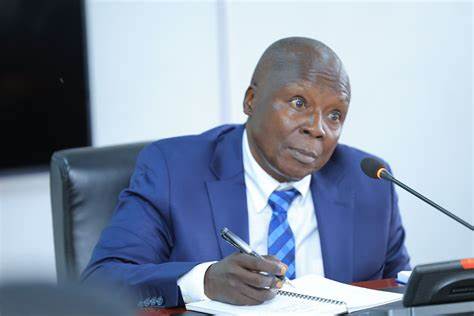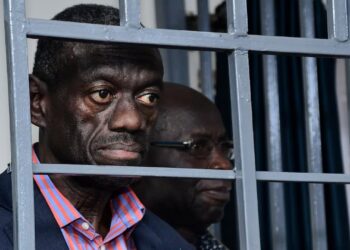In a closed-door vetting session, the Appointments Committee confronted the new Inspector General of Police (IGP) Abbas Byakagaba and his deputy James Ochaya with a barrage of questions. The appointment of these officials by President Museveni comes on the heels of the retirement of Martins Okoth Ochola, marking a significant shift in Uganda’s security leadership. However, the appointments have been met with skepticism and stringent demands for accountability, particularly concerning the welfare of police officers.
Uganda’s police force has long grappled with appalling living conditions, inadequate pay, and the haunting specter of the Exodus SACCO debacle. The force’s dilapidated barracks, meager salaries, and unfulfilled promises have rendered its members disillusioned and demotivated. The Leader of Opposition, Joel Ssenyonyi, underscored these grim realities, refusing to endorse the appointments until the newly appointed chiefs provide a detailed and actionable plan to rectify these conditions.
The plight of Uganda’s police officers cannot be overstated. It’s a tragic irony that those tasked with ensuring public safety often find themselves in unsafe and unsanitary living conditions. Ramshackle barracks, lack of basic amenities, and insufficient medical care are just the tip of the iceberg. This appalling neglect not only undermines the morale of the officers but also compromises their effectiveness and integrity.
One of the most egregious issues that have plagued the police force is the Exodus SACCO scandal. This Savings and Credit Cooperative Organization was supposed to be a beacon of hope for officers, promising financial stability and support. Instead, it has become a symbol of betrayal and mismanagement. Funds that were meant to empower officers financially have mysteriously vanished, leaving them in a worse state of financial despair.
The appointment of Byakagaba and Ochaya has reignited concerns over the Exodus SACCO. The police force and the public demand transparency and accountability. How will these new leaders restore faith in the SACCO and ensure that such a travesty does not recur? Without clear answers and a robust plan, their leadership is bound to face relentless scrutiny and skepticism.
Ssenyonyi’s stance is not merely an opposition tactic; it’s a clarion call for radical reforms. The police force’s welfare is a matter of national security. Officers who are demoralized and financially strained are more susceptible to corruption, abuse of power, and inefficiency. This, in turn, erodes public trust and hampers effective policing.
To truly reform the police force, Byakagaba and Ochaya must prioritize the following: Immediate steps must be taken to renovate police barracks, ensuring they meet basic standards of safety and sanitation. This is not just about aesthetics but about human dignity and functionality. Police officers deserve salaries that reflect the risks and responsibilities of their job. An independent review of the pay structure should be conducted, and adjustments made to ensure fair compensation. A forensic audit of the Exodus SACCO must be conducted, and those responsible for the mismanagement held accountable. Future operations should be transparent, with regular audits and clear communication with members. The physical and mental well-being of officers should be a top priority. Comprehensive healthcare services and welfare programs need to be established and maintained.
Byakagaba and Ochaya face an uphill battle. Their leadership will be scrutinized not only by the parliament but by the very officers they are supposed to lead. The police force is at a crossroads, and its future hinges on the actions and decisions of these new leaders. Will they rise to the occasion and implement the much-needed reforms, or will they succumb to the same pitfalls that plagued their predecessors?
Their tenure will be a litmus test for President Museveni’s commitment to reforming the police force. It is easy to appoint new leaders, but it is far more challenging to empower them to enact real change. The president’s support for these reforms will be crucial. Without it, Byakagaba and Ochaya’s efforts may be in vain.
The public’s patience is wearing thin. Ugandans are tired of hearing promises that never materialize. They want action, not rhetoric. The appointment of Byakagaba and Ochaya has stirred a hornet’s nest, with citizens demanding concrete measures to improve the police force’s welfare and accountability. Questions abound: How will the new IGP and his deputy tackle corruption within the force? What steps will they take to ensure that the Exodus SACCO is restored to its intended purpose? How will they address the chronic underfunding and neglect that have plagued the police for decades?
The vetting of Byakagaba and Ochaya is more than a routine political procedure; it’s a defining moment for Uganda’s police force. The issues raised by Ssenyonyi reflect the broader discontent and frustration that have been simmering for years. The new leaders have a unique opportunity to turn the tide and restore the dignity and effectiveness of the police force. As the dust settles on the vetting process, all eyes will be on Byakagaba and Ochaya. Their success or failure will not only impact the police force but will also shape public perception of Uganda’s commitment to justice and reform. The stakes are high, and the time for decisive action is now.







Discussion about this post